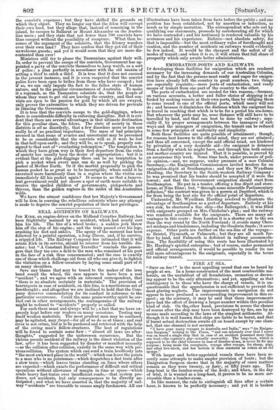REAL ACCIDENTS ON RAILWAYS.
on Naas, an engine-driver on the Midland Counties Railway, has been frightfully maimed by an accident, which had nearly cost him his life. The tire of a wheel broke ; a sudden jerk threw him off the step of hisngine ; and the train passed over his legs, crushing his feet and ankles. The agony of the moment has been followed by a painful operation, a long illness, and, if he survive, a crippled life. The Railway Company has intimated that it will retain Kirk in its service, should he recover from his terrible dis- aster; but "A Constant Railway Traveller" reminds the passen- gers that they too owe a debt to the man who remained at his post in the face of a risk thus consummated ; and the case is exactly one of those which challenge aid from all who can give it, to lighten the visitation on a fellow-creature by laying some small part of it on many shoulders. Save any blame that may be traced to the maker of the iron band round the wheel, the case appears to have been a real "accident"; and we agree with an esteemed correspondent, that "there is no absolute certainty in materials." The provision of tourniquets in case of accidents, on this line, is a meritorious act of forethought; and altogether we are inclined to hold that the Com- pany deserves commendation for its conduct in reference to the particular occurrence. Could the same praiseworthy spirit be car- ried out in other arrangements, the contingencies of the railway might be reduced to " accidents " properly so called.
For such there must and always will be ; a fact that we have ex- pressly kept before our readers on many occasions. Testing may itself weaken materials. The most prudent man may be confused, may be agitated, may forget—for all of us do so at times ; and real error is not crime, but is to be pardoned and retrieved with the help of the erring man's fellow-creatures. The best of regulations will be found to oontain some flaw : "almost all laws are after- thoughts," suggested by the unforeseen occurrence. But the viCions pseudo accident of the railway is the direct violation of the law, after it has been suggested by disaster or manifest necessity —as the collision after collision, exactly in the same way with pre- vious collision. The system which can send a train heedlessly into "the most awkward place in the world"—which can leave the points to a man who is no pointsinan—which despatches a fast train after a slow train—which leaves trains standing on lines where others are expected—which exacts the performance of difficult and critical operations without allowance of margin in time or space—which sends heavy fast-trains over insufficient roads,—that system pro- duces, not accidents, but only consequences to be directly an- ticipated and what we have asserted is, that the majority of rail- way " accidents " are traceable to causes amply foreknown. All our
illustrations have been taken from facts before the public ; and our position has been established, not by assertion or induction, so much as by simple narration. The correspondent who sets out by qualifying our statements, proceeds by corroborating all for which we have contended ; and his testimony is rendered valuable by his acuteness and his experience. Enforce—not absolute safety, for that is impossible—but the most ordinary rules of forethought and caution, and the number of accidents on railways would evidently be few indeed. It would be the cheapest and the safest of all modes of transit ; and when it is so, it will attain that full share of prosperity which only awaits better administration.


























 Previous page
Previous page